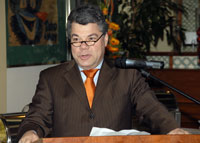 Barley is another crop that has the potential to be part of the next generation of ethanol.
Barley is another crop that has the potential to be part of the next generation of ethanol.
North Dakota’s Farm and Ranch Guide reports that it was a topic at last week’s 2007 Dakota Grains Conference in Bismarck.
Dr. Kevin Hicks, Agricultural Research Service, new hulless varieties and processing technologies such as pearling may make barley a desired crop for ethanol plants. he Eastern Regional Research Center in Wyndmoore, Penn., is involved in a five-year project researching how barley can be used in the biofuels industry.
“Two years into the research project, we’ve already made exciting discoveries to help launch barley to the ethanol industry,” Hicks told producers and others gathered for the 2007 Dakota Grains Conference in Bismarck last week.
The major problem with using barley for ethanol is the hull, said Louis Arnold, president of the North Dakota Barley Council. Arnold, who is a leading barley producer in North Dakota, said the council helped build the ethanol plant in Walhalla. In the beginning, the plant used barley, but it didn’t work out. “It (the hard shell of the barley) ate the pipes up,” he added.
Some of the new barley varieties being released have “looser hulls” and Arnold believes these new varieties will be able to play a big part in ethanol if the hull can be easily separated.



 News coverage in advance of the president’s State of the Union address Tuesday is comparing the rhetoric of last year’s speech to what has really been accomplished so far when it comes to energy independence.
News coverage in advance of the president’s State of the Union address Tuesday is comparing the rhetoric of last year’s speech to what has really been accomplished so far when it comes to energy independence. Hello from
Hello from  It used to be the image of a modern oilman was a Middle Eastern sheik. But more and more, it’s an American Mid-WESTERNER. Case in point,
It used to be the image of a modern oilman was a Middle Eastern sheik. But more and more, it’s an American Mid-WESTERNER. Case in point,  Recently, both
Recently, both 


 Senator John Thune (R-SD) and Senator Ken Salazar (D-CO) this week introduced bi-partisan legislation designed to increase the availability of alternative fuels at the pump.
Senator John Thune (R-SD) and Senator Ken Salazar (D-CO) this week introduced bi-partisan legislation designed to increase the availability of alternative fuels at the pump.
 It’s
It’s